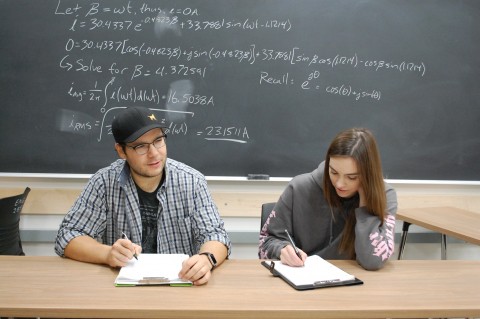Students are determined to succeed in their academic pursuits in the classroom. But when getting to and being in the classroom becomes a struggle for members of our student body, how do we ensure that all students have an equal opportunity for success?
To be frank, getting to class is a struggle for almost every student. It’s challenging to get out of bed after you stayed up until three in the morning, pouring over your textbook, or to sit through class after scrambling to the bus stop and arriving late for a 50-minute lecture with your monotone professor. Getting to class can be tough, and being in the right mindset for notetaking can be even tougher.
Although the reality described above impacts many students, there are added challenges for students with varying physical and mental abilities.
For students registered with Disability Services for Students at the University of Saskatchewan, there are programs in place to help them achieve the same academic success as their peers.
One of these services is DSS Notetaking. The service is straightforward: you take notes during class, and then you post them online to Blackboard. Those utilizing notetaking services will get a notification when the notes have been posted. The system leaves students anonymous, on both ends of the notetaking exchange, so that neither student has to share their identity if they do not want to.

Notetaking is a great way to keep yourself accountable in class.
The process is straightforward, but it is often stressful for the student registered with DSS. It’s not uncommon for the process to take weeks of waiting for a student to sign up to be a DSS notetaker. Sometimes, no one in the class signs up to be a notetaker at all.
There are also some common misunderstandings between students registered with DSS and students eligible to be notetakers. It is important to understand that students registered with DSS did not choose to have their disability.
Furthermore, registering with DSS is not a selfish ploy for students to “steal notes” from their peers — students must have a diagnosed disability or injury to register with DSS.
Finally, if you are a student who does not want to share your notes, because you take excellent notes that you would prefer not to share with people who are “too lazy” to take notes — I have heard this in some of my classrooms — you should reconsider your thoughts on DSS.
While you are taking notes, one of your peers may be experiencing a massive cramp in their hand, causing them overwhelming pain. While you are taking notes, one of your peers may be sitting on a washroom floor gasping for air because they are mid-panic attack. While you are taking notes, one of your peers may be unable to hear the professor’s voice over the deafening click of the person tapping their toe beside them.
Although there are barriers for some students pursuing education on campus, you can help by signing up to be a DSS notetaker. You simply email dssnotetaking@usask.ca with your class name, class number and section number.
At the end of the semester, and upon the completion of your notetaking, DSS will add the experience to your Co-Curricular Record. The CCR is a formal recognition of the university-approved activities you have partaken in at the U of S. When applying to other programs, a CCR can be submitted, and the experience of notetaking is an excellent addition to your future applications.
Consider becoming a notetaker, because not all students face the same challenges.
—
Kirsten Samson
Photo: Michaela DeMong
Leave a Reply